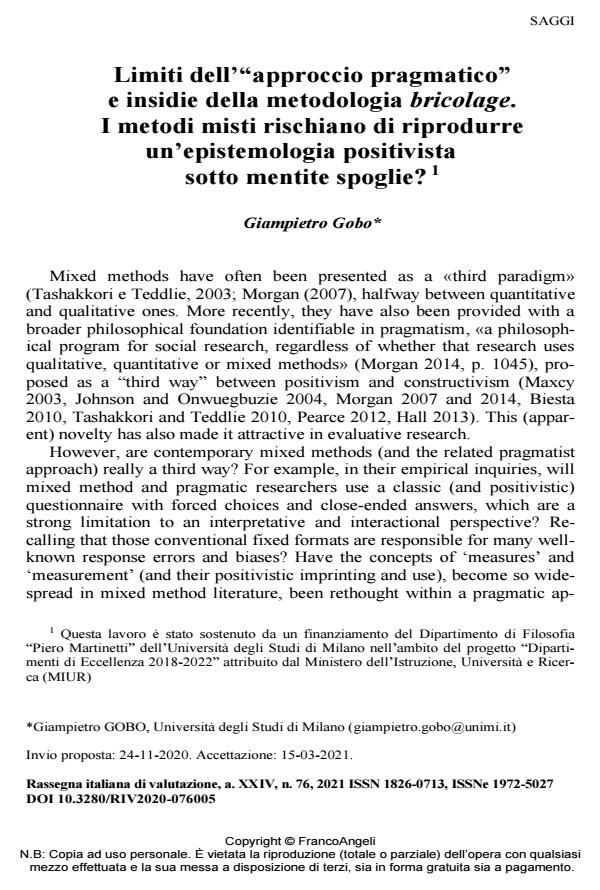Limiti dell’"approccio pragmatico" e insidie della metodologia bricolage. I metodi misti rischiano di riprodurre un’epistemologia positivista sotto mentite spoglie?
Titolo Rivista RIV Rassegna Italiana di Valutazione
Autori/Curatori Giampietro Gobo
Anno di pubblicazione 2021 Fascicolo 2020/76
Lingua Italiano Numero pagine 20 P. 71-90 Dimensione file 340 KB
DOI 10.3280/RIV2020-076005
Il DOI è il codice a barre della proprietà intellettuale: per saperne di più
clicca qui
Qui sotto puoi vedere in anteprima la prima pagina di questo articolo.
Se questo articolo ti interessa, lo puoi acquistare (e scaricare in formato pdf) seguendo le facili indicazioni per acquistare il download credit. Acquista Download Credits per scaricare questo Articolo in formato PDF

FrancoAngeli è membro della Publishers International Linking Association, Inc (PILA)associazione indipendente e non profit per facilitare (attraverso i servizi tecnologici implementati da CrossRef.org) l’accesso degli studiosi ai contenuti digitali nelle pubblicazioni professionali e scientifiche
Mixed methods have often been presented as a «third paradigm» (Tashakkori e Teddlie, 2003; Morgan (2007), halfway between quanti-tative and qualitative ones. More recently, they have also been provid-ed with a broader philosophical foundation identifiable in pragmatism, «a philosophical program for social research, regardless of whether that research uses qualitative, quantitative or mixed methods» (Morgan 2014, p. 1045), proposed as a "third way" between positivism and constructivism (Maxcy 2003, Johnson and Onwuegbuzie 2004, Mor-gan 2007 and 2014, Biesta 2010, Tashakkori and Teddlie 2010, Pearce 2012, Hall 2013). This (apparent) novelty has also made it attractive in evaluative research. However, are contemporary mixed methods (and the related prag-matist approach) really a third way? For example, in their empirical in-quiries, will mixed method and pragmatic researchers use a classic (and positivistic) questionnaire with forced choices and close-ended an-swers, which are a strong limitation to an interpretative and interaction-al perspective? Recalling that those conventional fixed formats are responsible for many well-known response errors and biases? Have the concepts of ‘measures’ and ‘measurement’ (and their positivistic imprinting and use), become so widespread in mixed method literature, been rethought within a pragmatic approach or only imported, underes-timating several epistemological, methodological and technical prob-lems related to measurement? While analyzing in detail the foundations of this approach, a num-ber of theoretical and methodological difficulties of the pragmatist proposal seem to emerge precisely on the level of .. research practices. Hence, although the pragmatic approach is proposed as a paradigm for the dissolution of differences and the neutralization of epistemological barriers, in practice it runs the risk of ending up reproducing the posi-tivist paradigm in disguise, by not problematizing and reforming cur-rent research methods. The evaluator should take this into account.
Parole chiave:Mixed methods, merged methods, measurement, epistemology, methodology, positivism.
Giampietro Gobo, Limiti dell’"approccio pragmatico" e insidie della metodologia bricolage. I metodi misti rischiano di riprodurre un’epistemologia positivista sotto mentite spoglie? in "RIV Rassegna Italiana di Valutazione" 76/2020, pp 71-90, DOI: 10.3280/RIV2020-076005